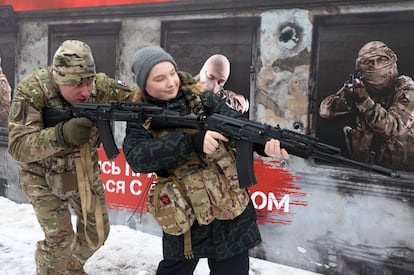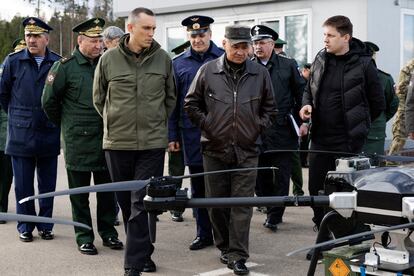Russian high schools to begin training children in the use of drones
The new subject is called “Fundamentals of Security and Homeland Defense” and joins others with which the Kremlin has militarized educational centers


As of the next school year, Russian students will be taught how to manufacture and fly the lethal drones currently targeting Ukraine. The government has announced a new program that will further militarize schools and universities to prepare new generations for war. The Ministry of Education will buy more than 17,000 drones this year, with the question of whether teachers will have sufficient knowledge of their functioning to impart to their students unanswered. Another possibility is for soldiers and Ukraine veterans and who currently tour Russia’s schools to deliver a Kremlin-friendly view of the war — sometimes wearing balaclavas — to teach students how to handle the unmanned aircraft.
Teachers in over 500 schools will start to receive training in July. “It is necessary to ensure that the program is fully ready as of September 1,” Deputy Prime Minister Andrei Belousov told a Cabinet meeting.
The program will be rolled out this year in hundreds of schools, although the ultimate goal is to have 4,872 specialized drone-piloting classrooms in schools and 380 separate practical training centers across the country by 2030. All these facilities will include an area for training with the devices and another reserved for 3D printers and other tools to manufacture and repair drones.
Although unmanned civilian drones have broken into many sectors from agriculture to industrial infrastructure overhaul, the Kremlin has turned its attention to their military applications as they have proven to be a differential factor in modern warfare. Russian President Vladimir Putin himself acknowledged on February 2 that a lack of drones is a serious problem for his troops. “Unfortunately, there is still work to be done here. It is one of our Achilles’ heels,” he said at an event dubbed “All for Victory!”
The Russian government acknowledges that the lack of drone training among schoolteachers is a challenge. Gradually, however, the military is starting to become a regular feature in Russian schools. Visits by Ukrainian war veterans to classrooms have become a constant over the last year, sometimes causing controversy. The latest furor occurred when the newspaper Vazhnie Istorii reported that a Wagner mercenary who was sentenced to six years in prison and received a pardon after agreeing to fight in Ukraine spoke at a school. The serviceman, Alexander Glazov, induced a 15-year-old teenager to suicide in the Blue Whale challenge game, although his sentence was commuted by the Kremlin when he agreed to go to the front, where he lost an eye and several fingers. Now he lectures other teenagers on the subject “Where does patriotism begin?”

Kremlin rewrites the history books
The Kremlin has also revived a Soviet tradition in educational establishments: the provision of basic training to minors before they are called up for compulsory military service between the ages of 18 and 30. In theory, this would help the Ministry of Defense recruit troops with a somewhat broader background. Although it is forbidden by law for young conscripts to be deployed in combat, commanders are trying to convince new recruits to sign a professional contract with the army so that they can be sent to fight in Ukraine.
The new subject is called “Fundamentals of Security and Homeland Defense” and will be taught starting next September 1. Occupying 36 hours per year, it will include basic military training during the last two years of high school, including the use of firearms. Students will also learn about the army structure and will be taught how to perform first aid.
The war of attrition in Ukraine has brought about changes in Russian society. In early 2022, the Kremlin tried to keep the population oblivious to what it still calls a “special military operation,” but the stalemate at the front has brought with it a gradual militarization of all layers of society, including schools. In the 2022 school year a compulsory subject was introduced, “Important conversations,” where every Monday students learn the slogans dictated by the Kremlin. Among them is a course on patriotism where 10-year-olds are required to recite phrases such as: “Do not spare your strength nor your life for the motherland,” “The motherland’s happiness is worth more than life itself,” and “There is nothing to fear in dying for the motherland.”
A year later, for the 2023 schoolyear, Putin’s advisor and head of his negotiating team in Ukraine, Vladimir Medinsky, rewrote the history books for high school courses. Medinsky himself claimed that “a drastic rewriting” was necessary from the last decades of the Soviet Union to the present, including the war unleashed against Ukraine. Among other distortions of history, the Kremlin conveys to students that the protests of Ukrainians against the government of Viktor Yanukovych in 2013 and 2014 were a “military coup” promoted by the U.S. and NATO as a result of which arose, according to their version of events, “Ukrainian neo-Nazism.” The textbook underpins the Kremlin’s view with omissions and manipulations. As proof of the alleged threat from the Atlantic Alliance the textbook cites the accession of neutral Finland, although it fails to mention that this took place in 2023, a year after Helsinki witnessed Russia invading another of its neighboring countries.
Sign up for our weekly newsletter to get more English-language news coverage from EL PAÍS USA Edition
Tu suscripción se está usando en otro dispositivo
¿Quieres añadir otro usuario a tu suscripción?
Si continúas leyendo en este dispositivo, no se podrá leer en el otro.
FlechaTu suscripción se está usando en otro dispositivo y solo puedes acceder a EL PAÍS desde un dispositivo a la vez.
Si quieres compartir tu cuenta, cambia tu suscripción a la modalidad Premium, así podrás añadir otro usuario. Cada uno accederá con su propia cuenta de email, lo que os permitirá personalizar vuestra experiencia en EL PAÍS.
¿Tienes una suscripción de empresa? Accede aquí para contratar más cuentas.
En el caso de no saber quién está usando tu cuenta, te recomendamos cambiar tu contraseña aquí.
Si decides continuar compartiendo tu cuenta, este mensaje se mostrará en tu dispositivo y en el de la otra persona que está usando tu cuenta de forma indefinida, afectando a tu experiencia de lectura. Puedes consultar aquí los términos y condiciones de la suscripción digital.








































